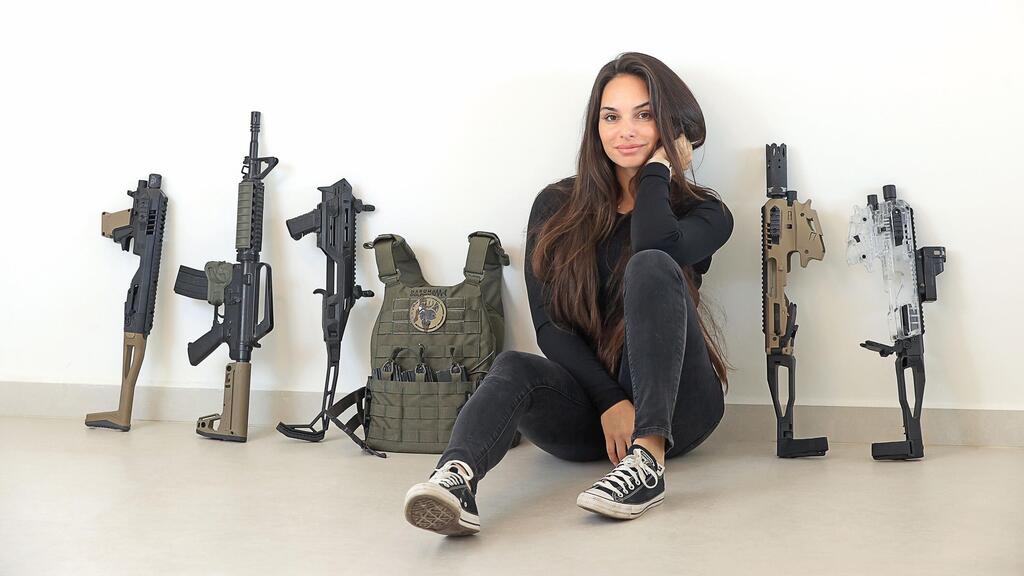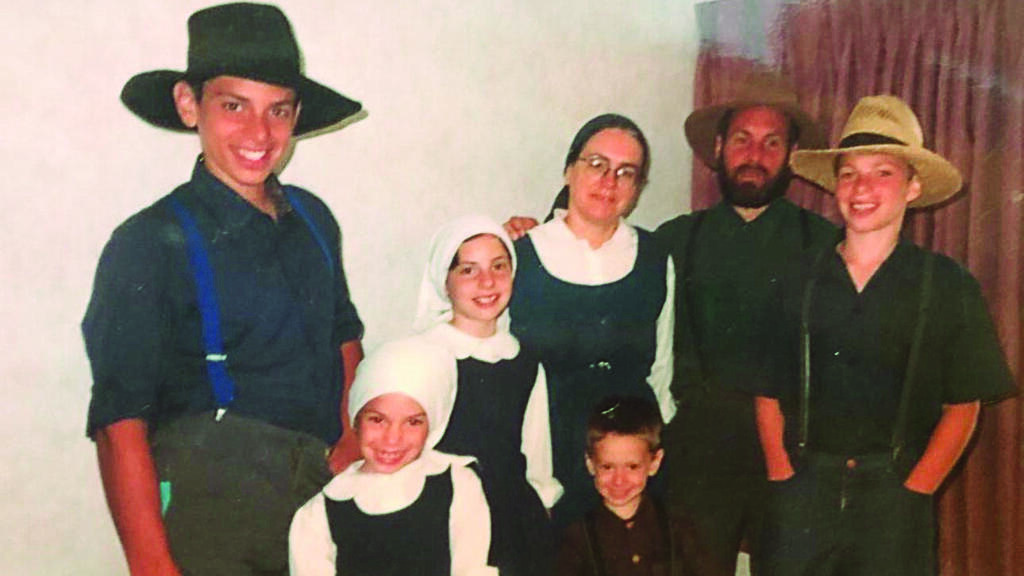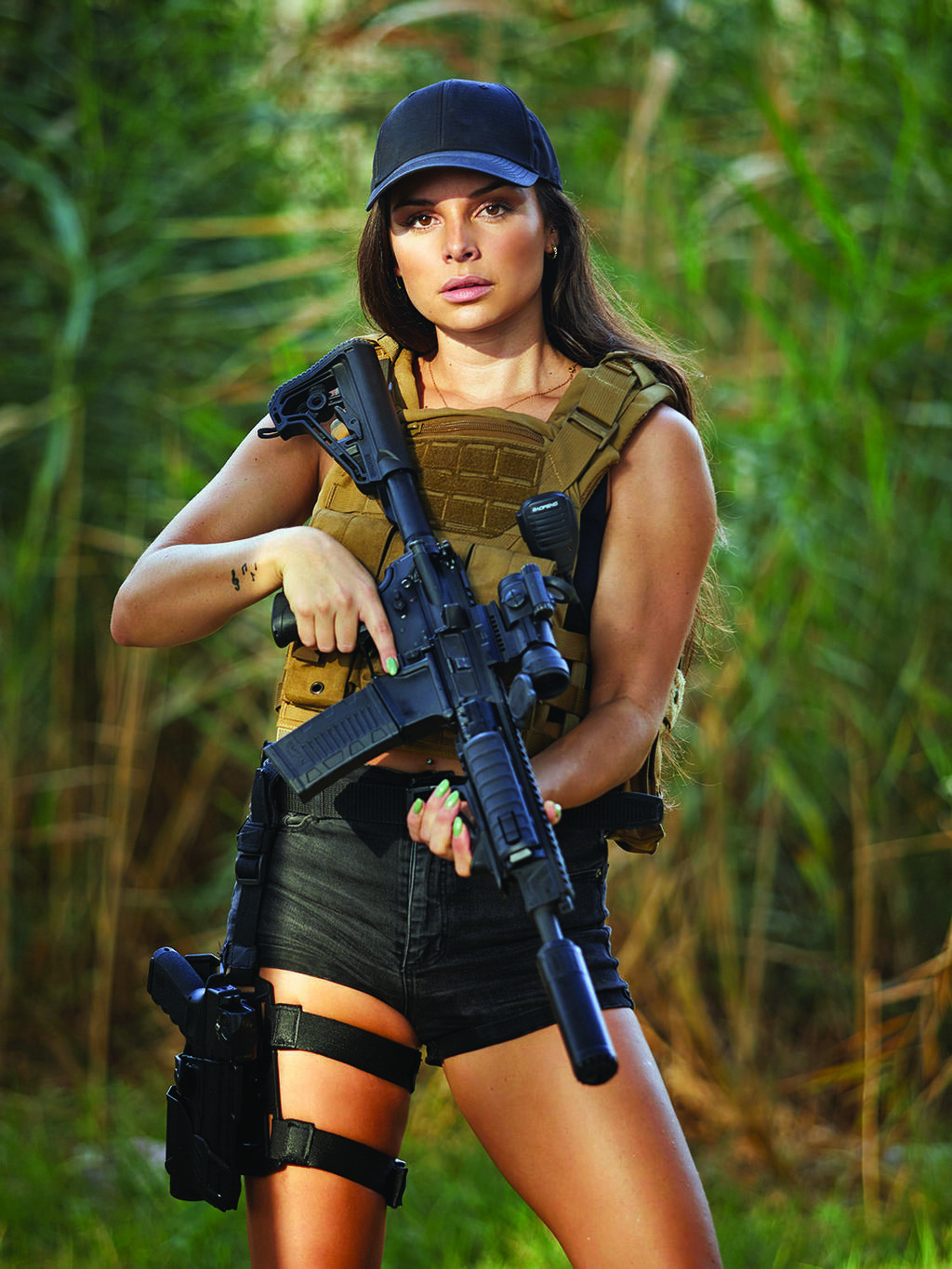The wedding invitation of Lovie Malespin and her partner was designed as an unusual video clip: it featured the couple shooting at targets, smiling at each other, and asking to Save the Date. "No one was surprised," she laughs, "It was funny and different, but this is entirely who we are. My partner and I met through a mutual friend at a shooting range four years ago when we both attended a competitive shooting course.'
The wedding was scheduled for November, but you postponed it because of the war.
"Yes, all our friends were on reserve duty, including my husband, and we didn't know whether we would get married this year or delay it. Eventually, as soon as the ceasefire started, we held the wedding on a Friday morning. Everyone danced and rejoiced with us; they needed it, and there was a large pile of weapons to keep the wedding safe. By the way, my husband returned to the reserves four days later."
From the isolated house in Ohio to the Old City in Jerusalem
Malespin, who lives in Or Akiva, works as a social media manager and at the same time serves as a model of weapons and complementary equipment and poses for instructional videos in English for the international clientele of the arms companies she works for. When she sits down in the café, she places a beautiful designer bag next to her, and only later does it turn out that inside the bag is a "Ramon" pistol manufactured by the EMTAN Israel small arms industry, for which Malespin works. At home, she has a bigger gun ("too big to fit in a bag"), which she uses in shooting competitions in Israel and abroad. "I don't like flamboyant guns," she clarifies, "I like them black and dirty. A gun that I dipped in mud and can still fire, is the best in my opinion. But yes, I ran into a weird American woman who asked for a Prada print on her gun. These are things that you see more In the U.S. and less in Israel."
She is 31 years old, born in the U.S., the fifth of six children of a Jewish-American father and a Christian Canadian mother. Her parents chose to name her after the word LOVE. "My mother was raised in a difficult home and left it at the age of 14," she says. "Thinking that God had revealed himself to her, she walked the streets of California and talked to people about Jesus, aiming to bring them back to repentance. My father, who was raised in a Jewish home, saw a beautiful woman playing in the street, was intrigued, fell in love with her, followed her, and became a Christian."
Lovie's parents joined the Messianic Christian movement The Road Ministry, better known as The Brethren. "In the 1960s they gave up everything and moved to live on the street. According to their belief, they were not allowed to provide for themselves but for God, and God orders them not to work and not to buy themselves anything, as money is the devil. Then my brothers were born, my mother wanted them to have a normal life so she left with them. After a while my father took the children away from her and she hasn't seen them for several years. Four years later my father returned with my brothers. Don't ask me how, but my parents got back together (and only years later they divorced), they left the "Road Ministry" and joined the Amish community."
Lovie was born and raised in the Amish, a closed Protestant Christian community. The Amish people engage in agriculture, oppose weapons and military service, avoid services of state institutions and even the use of the Internet is not allowed.
What kind of childhood did you have
"We lived in the state of Ohio. We had a big wooden house by a stream and there was nothing near us for miles. We were cut off from most of the world. We grew our food. We had fields, and there was no shortage of food. My dad worked in an apple factory, and we had a clear job: to milk cows and farm the land. We wore skirts and head coverings, and we were not allowed to talk to men. The education was strict, but I felt good. I didn't know what it was like to live in the city or wear pants, put on makeup, or apply nail polish. We were not allowed to go to school. My brothers were homeschooled and studied at home."
With such a background, how did you get to Israel?
"When I was seven years old, my dad realized that we had to get out of there. They went through a difficult time that I prefer not to elaborate on.
"Dad dreamed of immigrating to Israel and we had no money to fly, we barely had any clothes. Someone from the community gave us some gold jewelry because he wanted to help us, my parents sold the jewelry and that's how we got here."
What was it like to settle in Israel?
"It was extremely difficult for me. Think of a good Amish girl who had never seen the world outside and arrives in a country where everyone hugs, speaks, and dresses differently, and you also have to go to school. It was very foreign to me. We came with our clothes in a backpack, without knowing the language, without a job, but with Dad's vision. We stayed in a very poor hostel in the old city of Jerusalem which had bunk beds, and eight people together. I had to go to school because my parents got a letter from the welfare authorities and realized that they had to send us. When I, a girl with a dress, got to school for the first time, the teacher asked, 'Who wants to sit next to Lovie?' I didn't understand what she was saying, but all the girls in the class raised their hands. I was enrolled in 2nd grade, but I repeated it the next year. That's how I learned Hebrew, I didn't go to Ulpan.
"From Jerusalem, we moved through at least 20 apartments. We lived in Lod, Bat Yam, Gan Yavneh, Kiryat Ekron, Rehovot and more. I worked hard all my childhood at various jobs, from washing dishes to distributing flyers. It was a difficult childhood that built me into a strong woman who can cope with everything. I'm thankful for it despite everything I've been through."
From the street to the hostel and to boarding school
At the age of 14, she moved to a boarding school. "When I started acclimatizing in Israel, I wanted to be like all the other girls: wear tight jeans and have a boyfriend," she says. "My parents opposed to everything I did. For them, it was a sin that would lead me to hell. So, I did everything I wasn't supposed to do and took it to the extreme, and it led me to difficult places because I felt suffocated but also abandoned. My parents didn't want me to be a negative role model for my siblings.
"For a long time, I chose to engage only in negative deeds and I didn't believe in myself. I drank alcohol, used drugs, and hung out with the wrong people; I didn't respect myself in many aspects. I hitchhiked, there were times when I didn't know where I was when I woke up and what I was doing there. I developed a thick skin.
"At a certain point, social workers took me from the street to a hostel for girls at risk in Tel Aviv. There I realized that I was not problematic, I simply could not get along with my parents' beliefs and strictness. Until a boarding school was found for me, I lived with friends whose mothers welcomed me into their homes. To this day, I have 'mothers' in some places. From the hostel, I moved to Mosenson boarding school in Hod HaSharon and stayed there throughout high school – sophomore to senior year. I would also spend the weekends there.
"Before I arrived at the boarding school, there was this one social worker, Na'ama, who believed in me. When I was at the bottom and told her, 'Leave me alone, I don't feel like living in this world, no one wants me,' she told me, 'You will go far.' There were nights when I would run away from home and sleepover at her place. When I graduated high school with a matriculation certificate, I called her up, even though we were no longer in touch. Do you know what it means to me having a matriculation certificate, after spending time on the street?"
Are you in touch with your family today?
"Yes. Yesterday my brothers came over to my house. They supported me mentally and financially and in times of crises they pushed me, encouraged me to cope."
From anti-terrorism unit to exhibitions in Las Vegas
She started engaging with weapons after serving as a shooting instructor in Lotar, the IDF anti-terrorism unit. "My older brothers enlisted in the army when they were 20 or so and they served in elite units in the IDF," she says, "I saw them with their weapons, and it interested me. I was a tomboy girl and was fascinated with this world. But enlisting in the army wasn't easy for me because of my past; I was told that I was not stable enough to serve in a combat unit and could not even be a combat supporter. I started with basic recruit training and struggled to prove them otherwise. I did everything in my power to avoid serving as a noncombat. I would get up every morning at four and organize sports lessons for our company. I talked to the commanders and fortunately, my officer noticed the fire in my eyes and eventually, I was assigned to being a shooting instructor in the anti-terrorism unit. That's how the door to this world opened for me."
And how was your military service?
"It was fascinating. Every week we would arrive at a different base and train different units. Each time I would stay with them for a week in the field or they would find me a room in some base. At that time my parents got divorced, and I was considered a lone soldier, so I was provided with a rented apartment in Tel Aviv, but mostly I was with the soldiers in the field. It was a huge responsibility for me because I knew that if there was a war or an operation the soldiers would use what I had taught them. I felt that I couldn't blow it this time or say to myself, 'I am tired today.'"
When she finished the army, about a decade ago, a friend sent her an advertisement for a weapons equipment company that was looking for a model. "I met with them and was hired the same day. They told me, 'Let's have your training videos distributed in the international market as well.' It started with a video or two, and it rolled out from there. This field was not yet developed in Israel. My boss hired more gun models, we started a trend and today many girls do it, but I was the first. The modeling itself is less interesting for me, I'm more interested in tutorials, informational videos, and training that I give."
Later on, Malespin began to model and film informational videos of weapon accessories for companies such as "Fobus", "IWI", "FAB Defense", "Frontline" and "Emtan". "There are many arms companies in Israel, more than people realize. I promote each Israeli product worldwide," she says. "Israel is considered one of the recommended countries for buying weapons; customers trust the arms we use in practice because of our experience in combat, and at exhibitions many people visit our booths, showing interest in our products. I show them the value of our products and demonstrate how to use them. After all, I am savvy in the field, not just a model," she emphasizes.
Last year she was ranked fourth in Israel's National Women's Sport Shooting Championship. "There aren't many women in this field, but today there are more women than a decade ago," she says. "I do several workout sessions a week which involve shooting, running, opening a door, crawling, climbing, lying down, and all is done during live fire."
Last January she represented Israel at the SHOT Show, the world's premier exposition of combined firearms that takes place in Las Vegas annually. "This year it was especially exciting to display Israeli companies, and to show that we are a strong nation that does not give up."
Have you encountered any manifestation of hatred?
"Yes, there were demonstrations outside. But others hugged me and said, 'We are with you.' I represent a country that I was not born in, but this is my country."
From your point of view, how did the war affect the weapons industry in Israel?
"All the weapons companies are working very hard right now. There is a lot of work and a high volume of sales of weapons and tactical equipment. I also see countless donations to IDF units. The companies which I represent are working around the clock to supply equipment to the security forces, the police, the Yamam (special units), and the Shin Bet."
Do you think all Israeli citizens should carry a gun?
"Yes, for our security sake. Many events would look completely different if citizens who are allowed to own a gun were armed."
Don't you think that a less supervised arms distribution will increase violence against women?
"No. If we hand out weapons to more citizens, I don't think it will affect violence against women or in general. Anyone who wants to hurt another person will use either their hands or an old kitchen knife or throw a heavy stone. So, are we supposed to collect all the stones in the world and all the knives? The violence can only be solved through education."
What about gun accidents?
"The fear that we will be like America is not justified. We are not Americans, and we weren't raised like them, witnessing some kid out of nowhere start shooting at school. This is what everyone's afraid of, but we are not like them. Israelis are different, very special, and different. We all need weapons, that's certain; and if I could, I would also have a long gun in my house, like the Americans. Even more than one."
Don't you think it's too much?
"Not in my opinion. What do you like? Bags? Shoes?"
Yes.
"And do you have a closet full of shoes?"
There are some, yes.
"Well, don't you find that too much? So, I happen to have two guns and I wish I had more. We all served in the army and know how to shoot weapons, some people know more and some less, but if, God forbid, something were to happen now and I brought you a gun, you would probably know how to use it. I want to be a role model for women, so they won't be afraid of weapons because that's how we can protect ourselves."




